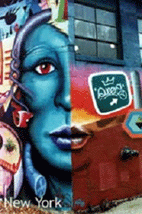|
|

|
|
In June of this year, more than 50 women were sexually assaulted by marauding groups of men during the National Puerto Rican Parade in New York City. The police have charged 30 men in the attacks and are searching for 17 others. Aside from the depravity of the assailants, contributing factors to the assaults included drug and alcohol use and a laizze faire attitude by the NYPD. Now in the aftermath of this violence against women, the parade's directors are considering a ban on some floats carrying rap performers whose music, they claim, glorifies violence and attracts the unruly mobs that have damaged the parade's reputation. Frederico Perez, a board member since the 1960s and a former councilman from the Bronx, was reported as saying that some of the rap music had "negative connotations;" attracting youths who take their shirts off and become boisterous hordes. Perez stated that, "We want music that is representative of us. That is representative of the Hispanic." To make a statement like that, Perez shows that he is unaware of the Latino contribution to Hip-Hop. Anyone who traces the history of rap music and hip-hop culture knows that Blacks and Puerto Ricans in New York City were the originators of the art form. Individual MC's and DJ's were in well-known groups like Fearless Four and Fat Boys. After Kurtis Blow, the Fearless Four was the first rap group to be singed to a major record label [Elektra]; creating classics like "Rockin' It" and "Problems of the World." The crew included a Puerto Rican named "Devastating Tito" Dones and DJ Oscar "O.C" Rodriguez. Also there is also the legendary DJ Charlie Chase who spun for the Cold Crush Brothers. Although rap artists like Mase, Puffy and LL Cool J have dabbled in Spanglish [the hybrid of Spanish and English] on some of their records, they were not breaking any new ground. In 1981, an MC crew called the "Mean Machine" put the first bilingual rap on wax with the song the "Disco Dream" for Sugar Hill. Additionally, Mellow Man Ace's 1990 song, "Mentirosa," was the first Latino rap record to go gold. Today Latino artists like Fat Joe, the late Big Pun, Noreaga and radio personality Angie Martinez are considered just as much a part of hip-hop as Busta Rhymes or Redman. For years the parade has attracted Latino and African-American rap artists and DJs who pay for their own floats or are sponsored by radio stations. Rap artist Fat Joe, whose real name is Joseph Cartagena, was quoted as saying that he and other artists believed that the parade officials failed to welcome them despite their popularity among Puerto Rican youth. According to Fat Joe, "The problem with the board is that that everyone is very old, and even without this problem happening this year, we always have different problem with them each year." He added, "It seems like our money is good and the attention we bring to the Puerto Rican Day Parade is good, but our cause is not really accepted." Parade board member, Madelyn Lugo, echoed Frederico Perez's statement about the music being "representative of Hispanics," by saying that "If they play music, they can play something in rap, but they should identity at least with Puerto Rican culture." It would be easy to write off these people as old fogies who seem to be clinging to memories of mambo king, Tito Puente, in the way one wrote off the Reverend Calvin Butts when he choose to steam roll rap CDs in Harlem several years ago. The difference in this instance however is that the parade officials' comments are tinged with racism. Latinos and African-Americans have always had a precarious relationship. In many states like California, New York, Texas and Florida, all of which have large Latino populations, the two groups often occupy the same low-end of the economic totem pole. Despite our proximity to one another, there is real tension between Blacks and Latinos. It seems that many Latinos seem to harbor the same racial prejudices against Blacks that Whites do. In a recent New York Times series on race, white Cubans warned a new immigrant, a white Cuban, to stay away from Black people and Black neighborhoods in Florida because Blacks were deemed lazy and prone to criminality. Now two boyhood friends, one a white Cuban and the other an Afro-Cuban, once in America have ceased to associate with one another since here white Cubans can publicly exhibit their racial bias more openly than in Cuba. In New York in particular, the mass migration of Puerto Ricans to New York began in the 1950s, and from that time on, African-Americans and Puerto Ricans [as well as other Latino groups] have lived near each other, worked together, and married each other, yet there are still issues around race. When Puerto Rican actress/singer, Jennifer Lopez appeared in court to testify for her boyfriend, rap artist, Sean "Puffy" Combs, I saw a Puerto Rican spectator say to the television news reporter that Lopez was "disgracing her race," by defending Combs. The last time that I checked, Puerto Rico was not a race but an island comprised of the descendents of Taino Indians, African slaves and Europeans. An acquaintance of mine, when mistaken for an African-American, will instantly state that she is "Puerto Rican, not Black" as if the two were mutually exclusive. The connotation in those statements is that Puerto Ricans are different, if not superior, to average Black people. Similarly, although the attackers were a mix of Black and Latino men, in one television interview a parade official stated that after viewing the videotape of suspects, he knew that were from "outside of their community;" i.e. was not Puerto Rican. As a viewer I thought that this was an asinine statement, since there are White Puerto Ricans, Black Puerto Ricans and everything in-between, so how could he tell from a videotape who was Puerto Rican, much less who is even Latino? People often approach me speaking Spanish, so looks alone definitely cannot identify an "average Black woman" from a Latina. Such presumptions are based on what the Latino deems is Latino; Perez and his ilk live in one reality while the people who approach me live in another. Many Latinos, including rap artists and radio personalities, oppose the rap ban. Bronx Assemblyman Ruben Diaz, whose district includes the Bronx River Houses where rap music was born, said that he thought that Perez's assertions were off the mark. Diaz is quoted as saying, "I love rap music and I didn't grow up hassling women." Diaz, whose parents are from Puerto Rico also said, "Somebody who says rap music or hip-hop is not part of Puerto Rican culture would be sadly mistaken." Parade officials, by targeting rap music as disruptive, from "outside" elements and not "Hispanic," are merely exposing their own latent racial biases. At issue is not cultural pride but acknowledgements that rap music, with its African-American roots and following, is indeed part of Latin youth culture. Parade officials indeed have the right to limit music that they deem offensive, however banning rap alone will not necessarily prevent future incidents. In order to curb parade violence, officials of National Puerto Rican Parade need to acknowledge that they have failed to take responsibility for any part of the melee not educating revelers [of any race or color] not to bring drugs and booze to the parade. Additionally, their voices have been virtually non-existent in admonishing the NYPD for their shoddy paroling. Ultimately, rap is a form of entertainment that does not appeal to all, but violence will be curtailed not by censoring the messages, but by getting to their origins. It is far too easy to say that youth are feeble brained and thus susceptible to rap's messages rather than do the necessary work to alleviate the poverty and dysfunction that mar their existences.
[Jurassic 5] [Zaakir] [Charli 2na] [Akil] [Marc 7even] [Jurassic 5] [Zaakir] [Marc 7even] [Akil] "Good evenening ladies and gentlemen welcome to Hollywood, California" [Charli 2na] [Zaakir] [Jurassic 5] |

 RAP
MUSIC: THE USUAL SUSPECT
RAP
MUSIC: THE USUAL SUSPECT